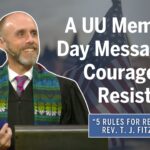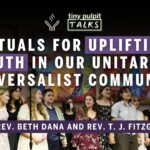Sisyphus never had it so good. | Faith & Film | Rev. Dr. Daniel Kanter | 06.02.24

Sermon Transcript
Well, you’ll be relieved to know that the only reference to court decisions this week will be that one. This sermon is about change. It’s about a film we watched this week. A time loop film where one answer in the film to how you get out of the loop is that every day is the same and it doesn’t matter what you do. And another answer is to love the people you’re with. And a third is that doing the right thing, atoning for previous faults or doing good wherever you can is important. And the overarching message is that none of these answers to life let you escape from your circumstances.
They don’t get you out of the loop, but they do make life better. This film and this idea all stems from the myth of Sisyphus. Sisyphus meets a God in the underworld only to lie and persuade the God to let him return to the world of the living. Sisyphus was successful with this plan, but after he died of old age, God punished Sisyphus by condemning him to roll a boulder from the base of a mountain to the top. The boulder will always roll downward, so the task will always be in vain. Life repeats as it did for Sisyphus. So it does for us.
Repetition at the minimum is that you wake up every day, you. You might be somewhere else, you may be with other people or in other circumstances, but you are never someone else. So the human dilemma is that we live in a loop and the question is what is our responsibility to it? The philosopher Frederick Nietzsche’s idea around this was called eternal return. I say this for those of you who need to hear Frederick Nietzsche’s philosophy on a Sunday morning. That eternal return, that time repeats itself in an infinite loop.
He wrote about it in a book, wait for it, The Gay Science, good for Pride Month. In his novel Thus Spoke Zarathustra, he explores how to overcome his horror of the thought of the eternal return. In the book, he asks, “What if some day or night a demon were to steal after you into your loneliest loneliness and say to you, ‘This life as you now live it and have lived it, you will have to live once more in innumerable times.’ Would you not throw yourself down and gnash your teeth and curse the demon who spoke thus?” He said. “Or have you once experienced a tremendous moment when you would’ve answered him, you are a God and never have I heard anything more divine.”
Sisyphus, the eternal return, the film Palm Springs that we watched this week asks, “Are you in an infinite loop? Are you pushing a stone up the hill and what will you do about it?” The sermon is about a film, an ancient story, a philosophical idea, and you. Not everyone in this worship service will believe that they can or should change, which is really the answer to the loop. Some believe that they are perfect and cooked and maybe anyway, there isn’t time left or time required to change. I say that is hubris.
That is the stuff that leads to deathbed conversions, the stuff of walking around thinking you got it all figured out. And when things go badly, acting surprised and affronted. People who think they can’t change or shouldn’t change are like brittle sheets of ice, cold and shiny, but breakable. If that is you, I have a sermon for you. If that is not you, I have a sermon for you. And it comes from our reading too, from Portia Nelson. A famous poem story and five chapters often passed around at twelve-step meetings.
I admit it’s a little obvious, maybe a little overused, but certainly worthy of our exploring. Portia Nelson was the author of the poem, probably thought she herself had it made at times in her life. She was the secretary of a famous movie director. She sang in cabarets and she started acting in movies. You would know her if you saw the film, The Sound of Music. She was the cantankerous Sister Bertha. She went on to write famous songs and sing with people like Carol Channing and Pearl Bailey and Harry Belafonte and Johnny Mathis and other stars that if you’re under 30 you might never have heard of.
Then at two points in her life, she got cancer. She had breast cancer, and after a mastectomy in 1973, she wrote this poem. “There is a hole in my sidewalk. I fall in. I walk around. I go another way.” It’s been turned into a musical and has sustained itself as an uncredited self-help text for almost 50 years. Well, some of you know and what I know is that cancer has a way of reorienting your life. Nelson died in 2001 of a recurrence of hers. I kept asking myself while I was pondering this story poem and all that we did this week, why’d she write that after her first cancer?
I can only imagine that she woke up to the scary fact that she wasn’t going to live a charmed and glamorous life forever. I imagine having been through cancer with some of you and in my own family, that cancer for her was a wake-up call to live fully in the time she had, to make amends, to change old habits that kept her and pulled her from her authentic life. I imagine the encounter of her own mortality demanded new answers to old habits, to feeling as if she was in the eternal return. In the popular book, on living and dying, The Tibetan Book of Living and Dying.
Sogyal Rinpoche quotes this poem and he says in that book, “The purpose of reflecting on death is to make real change in the depths of your heart and to come to learn how to avoid the hole in the sidewalk and how to walk down another street.” He says in that book, “You are not condemned by your habits. You can change and you can grow and you can be free.” Interesting words from a Buddhist who believes everything is change inevitable. They are encouraging words. Today, the text for us is this, a warning, an encouragement, a guide, a lesson, a tool.
It begs the question of whether we will identify our faults and change, whether we can address temptation by going another way, whether we exchange old habits and self-destructive behavior with new habits. Whether our job is to fix holes in society or in ourselves, and the question is whether you see the eternal return that you are in. You wake up every day, yourself. And the question then is life a gift or a condemnation? An opportunity or a chore? And one answer is that you are not condemned to your habits. You can change and grow and be more free.
The core theology of this in our church is that we have free will. That we are not living lives predetermined by God, but we are given God’s gift of life in order to find ways to use it. You are not condemned to your habits. To those who need to hear that today, I am with you because to acknowledge this is to love yourself. And to love yourself makes it more possible for you to love others. To shatter that thin ice of self and welcome who you truly are and need to be. To those struggling to hear a word in this, I encourage you to listen more.
Maybe make a list of some of the things you would change in your life. That list might include big things like stopping drinking or getting help with depression or small things like saying hello more to strangers or not cursing under your breath every time you have to rearrange the dishwasher. You can tell what’s on my list. Big things or small things, it could just be saying I love you more. It could be to acknowledge that maybe the biggest hole in our lives is thinking we have finally once and for all taken another street that will never have holes in it again.
Didn’t we learn sort of a little lesson on that when all the power went out this week? Here are three stories to conclude this sermon. Three stories. A man in his late eighties came to church here every week. He was confused sometimes, but when he listened to the sermons, he was very sharp. Every week he spoke to the minister who had preached with insight about his life. He said things like, “Regret is a hard thing to put down,” or “You made me think about how I might change my mind about my life and the direction that I have taken.”
He moved so slowly and ponderously we could see him thinking. He died during the quarantine. The ministers could never go visit him to see how he was ending in his pondering. He was always going around the hole in the sidewalk. Story two. A young woman whose parents were Chinese immigrants to Colombia ran a restaurant and raised her on the meager profits they could turn from fried tofu and spare ribs. One day when she was seven, her parents left her at her neighbor’s house and never returned. She grew up in that family’s home wondering every day why her parents didn’t want her, what she had done wrong.
One day she was in her twenties and became a nurse and was caring for an old woman whose family came into the room in the hospital. All girls her age, and they laid down in the bed lovingly with their mother. And the nurse burst into tears and was sitting on the floor in a pool of sorrow and she told them her family story and how every day of her life she asked herself why her parents had abandoned her. Why that had led to her bad decisions in relationships and failed others so she wouldn’t be abandoned again. And they called her over and asked her to come into the bed with them.
As she laid there, she felt changed. Her new family, the family that raised her she realized was enough. Her eyes were open. She knew where she was, going down another street. A third story. A young man in his twenties drank with his friends after work to kill the pain. The pain wasn’t anything specific except the train wreck of life’s encounters. Deeper was some pain, who knows what and why. Sometimes you never know. Some feeling of inadequacy as a child watching his father almost die when he needed him.
Complicated feelings about that relationship, trying to overcome some introversion with the loosening of drink. And then he had a child driving home some nights were acts of pure luck. Looking in the face of his child or in his own in the mirror he woke up somehow. He quit the late nights, turned to some more important things, got a grip on life, a path to health. He went down another road. Only one of those stories is about me so that you know I know what I’m talking about today.
I have seen both sides of all this. Those who walk down the same road and fall in the same hole and see life as condemnation, someone else’s fault. And those who see the hole and acknowledge it and go around it and go another way and see life as a gift. You can guess what I believe about which is the better way. You are not condemned to your habits, Friends. You can hold on or let go. You can succeed and fail, either way you should know that you are loved. And this eternal return, it kind of never ends. So make the best of it.
Nietzsche once wrote about this, that life is to suffer, but to survive is to find meaning in suffering. It’s up to you to get on a path to change if that’s your cross to bear, to make the decision to see the sidewalk, the hole the other way. To let go of the rock, to move on. And if you do, you’ll know a greater love, a greater love that holds you. I love you also. Amen.







